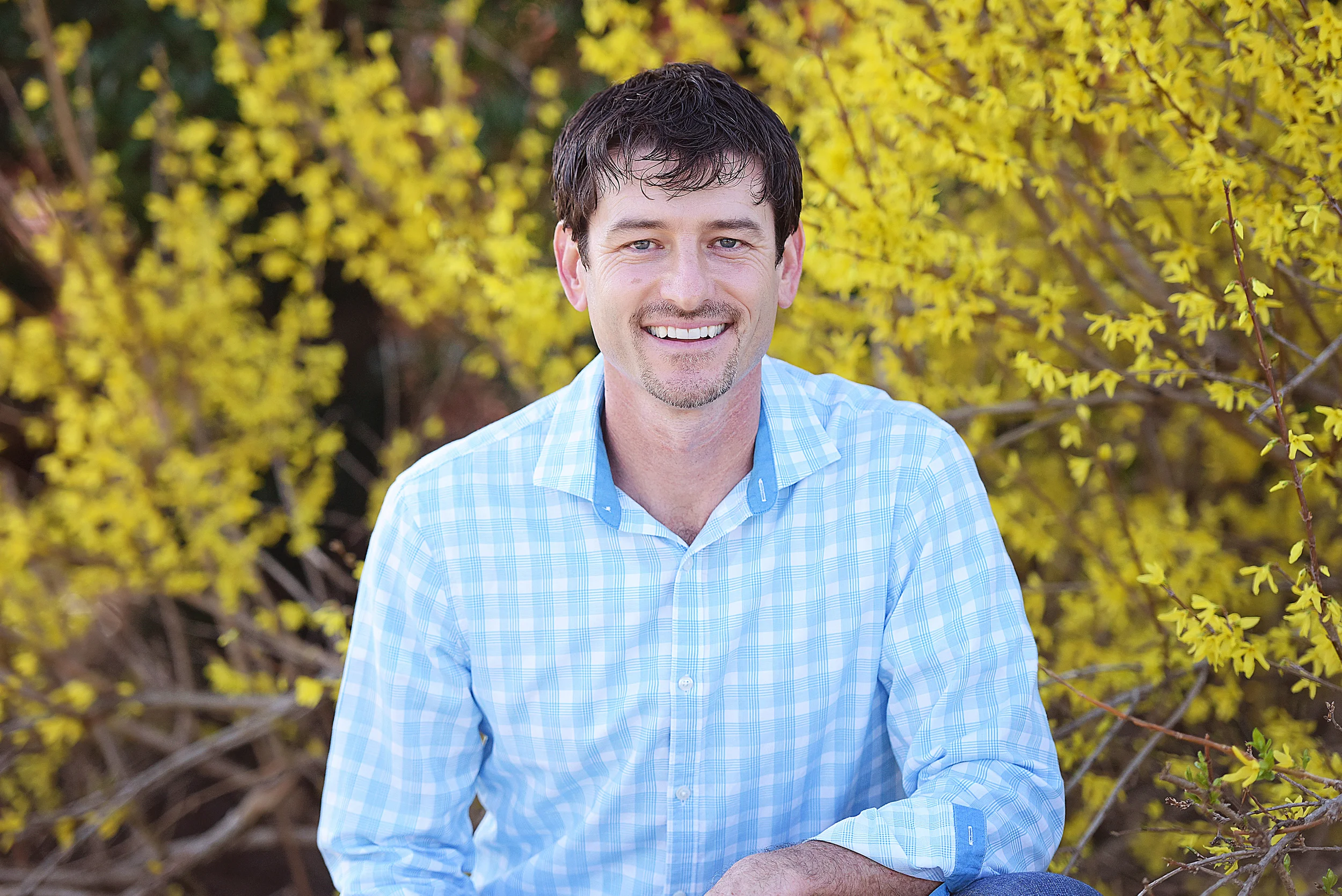VIProfile: Jason Reeves
/Curator of the University of Tennessee Gardens at the West Tennessee AgResearch and
Education Center in Jackson
Jason Reeves
Story by Lyda Kay Ferree, The Southern Lifestyles Lady. Photography by Kristina Only.
You may not know his face, but you probably know his work. He’s the man who paints trees, plants flowers in kitchen sinks and creates garden art from old bicycles, neckties and thousands of wine bottles.
Jason Reeves is the curator of the University of Tennessee Gardens, located at the West Tennessee AgResearch and Education Center in Jackson (old timers still call it the Experiment Station). When he’s not bringing the grounds to life with his imaginative garden displays, he’s evaluating hundreds of new and unique plants for the state’s green industry; traveling the world speaking at gardening symposiums and serving as a contributing editor to “Fine Gardening” magazine. His plant knowledge, creative designs and engaging speaking style have earned him the title “Rising Star” in the horticulture industry.
Of course, many gardening enthusiasts here in West Tennessee would argue that Reeves is already a star. His influence may be seen in landscapes across the region in the form of distinct plant combinations and his signature garden art. The annual Summer Celebration Lawn and Garden Show, in which Reeves serves an integral role, attracts thousands of visitors to Jackson each July.
Reeves was raised on a farm near Huntingdon, Tennessee. As a boy, his mother Linda, who is also an avid gardener, allowed him to choose and order seed from the Park Seed Company catalog each year. He fondly recalls growing giant cockscomb flowers to compete in the county fair, where he took first place for many years. As he grew older, and his love for gardening became more apparent, his family and their friends eagerly shared plants with him, fueling his drive for a career in horticulture.
Reeves, who has a Masters in Ornamental Horticulture and Landscape Design from UT, worked at botanical gardens in Missouri, Pennsylvania and New Zealand before landing at the UT Gardens Jackson in 2002. Under his care, the gardens have grown to include a Certified Tennessee Arboretum, a Southeastern Regional Conifer Display Garden, and the distinction (along with sites in Knoxville and Crossville) of being the state’s official botanical gardens.
The UT Gardens Jackson is open daily to visitors. Between sunrise and sunset, guests are encouraged to explore the grounds, discover new plants, and, of course, see Reeves’ most recent art projects.
VIP: What previous experiences inspired your work at the UT Gardens Jackson?
Jason Reeves: I did an internship at Longwood Gardens, a DuPont estate near Philadelphia, that also happens to be the largest garden in the U.S. Working there taught me a lot about display and attracting people to public places. The experience greatly influenced my work in the gardens here.
VIP: What do you enjoy most and least about your work at the AgResearch Center?
JR: Having the freedom to grow a wide range of plants gives me the ability to create interesting plant combinations and display them in fun ways. I love growing things from seed. To me it’s a miracle to start with a speck and end with a tree. For instance, a candlestick plant (Cassia alata) seed is 1/16 inches across and can grow to heights of 12 feet by the end of summer. This plant will be growing around the bottle wall this year.
My least favorite thing about my work is dealing with weeds. They hurt my back!
VIP: What is your most recent project at the UT Gardens?
JR: The bottle installation began in 2014 and is ongoing. With over 6,000 bottles in the garden, we continually add and edit this project. The bottle collection, like many of my projects, is about recycling and repurposing. The benefits are 1) We want to keep these items out of the landfill. and 2) They add attraction to the garden at a discount!
VIP: What are you working on now?
JR: We are planning Summer Celebration, our annual educational garden show. This year our theme is The Garden of Eatin’, and we’ll be incorporating vegetables and herbs with the ornamentals. You might see peppers and petunias or cucumber and coleus growing side by side, and several talks will focus on using vegetables and herbs in the landscape.
We’re beginning to come back around to growing our own fruits, vegetables and herbs. Not everyone has room for a vegetable garden, but it’s easy to incorporate some herbs and veggies in your landscape. At my house, I plant broccoli and onions in the spring in a landscape bed along my sidewalk.
VIP: Describe your childhood on a farm.
JR: Growing up on a farm made me appreciate nature and the outdoor life. We raised cattle and always had large vegetable gardens. Where I grew up, before people had flowerbeds, they planted flowers in their vegetable gardens for enjoyment. My mother and grandmother enjoyed flowers and grew rows of zinnias and coxcomb in the vegetable garden. I also remember that my great grandmother had a row of cannas in her vegetable garden every year. My grandmother and mother encouraged me to grow things myself. Of course, they weren’t all successful, but you learn from doing.
VIP: What’s your advice to West Tennessee gardeners?
JR: Buying plants at a big box store can be tricky. Get to know your local professionals and experienced gardeners. They can be helpful in making wise purchases. Also, the goal of the UT Gardens is to show homeowners and industry alike what plants will perform well in our area. You can come to the AgResearch Center and see what’s doing well before you make a big purchase. The upcoming Spring Master Gardener plant sale (Saturday, May 7) is another great place to buy locally grown and appropriate plants for our area. And if you’re looking for a reference book, Wyman’s Gardening Encylopedia by Donald Wyman (CR: 1986), covers a wide range of topics and is a wealth of information on plant material.
VIP: What advice would you offer aspiring and novice gardeners?
JR: You learn by doing, and I’ve made many, many mistakes. Go slowly and start small. Don’t plow up a half-acre garden the first time. Also, the Master Gardener program is a wonderful way to get started. Another good way to learn is to talk to other gardeners about their successes and failures. Most gardeners love to share not only extra plants but knowledge.
VIP: Do you enjoy vegetable gardening?
JR: Yes, I incorporate them in my landscape. My garden at home is a mixture, with the majority being ornamentals. I love all plants—trees, shrubs, annuals, perennials and tropicals.
VIP: It seems that more people are enjoying herb gardening.
JR: You can grow a lot of herbs in containers. Herbs can be attractive, but they also offer culinary benefits and many of the herbs are good for pollinators.
VIP: Are there any new gardening trends?
JR: Three trends come to mind: 1) Repurposing or reusing things in the garden, whether it’s a bicycle or a bottle. (My first repurposing effort here at the UT Gardens involved hanging 857 donated men’s neckties around the grounds. That was about 10 years ago, and it certainly garnered a lot of attention!) 2) Using more herbs and veggies in the landscape, not just the vegetable garden. 3) Growing plants to attract pollinators.
VIP: Do you travel out of the country every year personally and/or professionally and if so, do you select the country?
JR: Yes, a co-worker and I select the location and organize the trips. We’ve been leading an international garden tour every 18 to 24 months for garden volunteers and Master Gardeners. New Zealand by far is my favorite. I lived, toured and worked there for nine months. It’s a gardener’s paradise!
VIP: What is high on your wish list of gardens to visit?
JR: I would really like to visit some gardens in Tasmania and Australia.
VIP: What are some of your greatest accomplishments at the AgResearch Center?
JR: Enhancing the grounds and raising awareness of the gardens here in West Tennessee. I’m also proud of our conifer display garden. I wanted people to see which conifers thrive in this area. Often when people think of conifers they think of spruce, pine and fir. We can grow some pines here, but it’s too hot to grow spruce and fir. However, there are a lot of conifers that we can grow, and many of them may be seen in our conifer collection.
VIP: If you gaze into a crystal ball, what do you see yourself doing in the next 10 years?
JR: I plan on keeping the UT Gardens updated with new and improved plants. Educating the public about the gardens is also a top priority. In my personal life, I plan to build my dream home and gardens.
WHAT TO KNOW
The West TN Ag Research &
Education Center
605 Airways Blvd.
(731) 424-1643
west.tennessee.edu
Facebook: UT Gardens Jackson
CALENDAR OF EVENTS
Master Gardeners’ Spring Plant Sale
Sat, May 7, 7am–noon
Summer Celebration Lawn & Garden Show
Thurs, July 14, 9am–5pm
Fall Plant Sale
Thurs, Oct 6, 1:30–6:30pm

















































